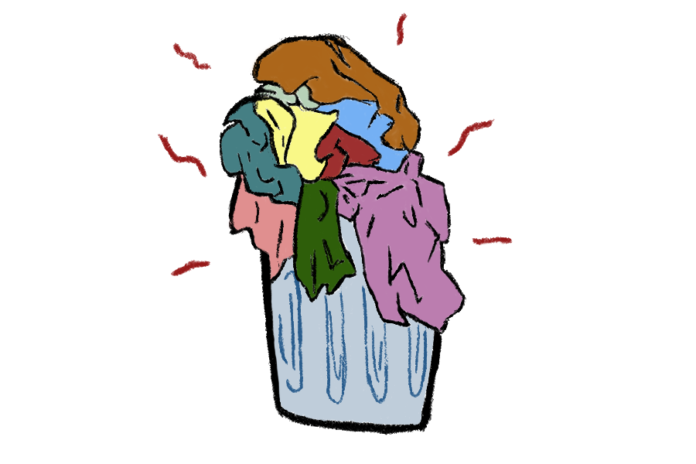Trendy trouble for our planet and people
By EMILIE BROWN — emrbrown@ucdavis.edu
Fashion trends may come and go, but the consequences of fast fashion are here to stay. As college students, most of us have fallen victim to the allure of inexpensive and trendy items from popular brands like Target, GAP, H&M or Zara. But it’s time we face the truth and understand the real price we pay for our trendiness. Brace yourselves for a journey through the dark side of the fashion industry, where social and environmental issues run rampant.
Let’s start with the environmental havoc caused by fast fashion. From production to disposal, this industry leaves a trail of destruction. The fashion industry is the second largest consumer industry of water, requiring about 700 gallons to produce one cotton shirt and 1,800 gallons of water to produce a pair of jeans. This level of consumption is simply unsustainable, especially when droughts are already parching our world.
The fast fashion industry isn’t just using up precious water — it also contributes to water pollution, as many textile factories still regularly dump untreated toxic waste waters directly into waterways, often resulting in dyed, toxic waters. In fact, it is estimated that 70% of the rivers and lakes in China are contaminated by the 2.5 billion gallons of wastewater produced by the textile industry.
But it doesn’t end there. Fast fashion also has a toxic relationship with greenhouse gas emissions, pun intended. The fashion industry and clothing production contribute a whopping 10% of global greenhouse gas emissions. Yes, you read that right.
Perhaps this percentage is not so surprising, considering we consume around 80 billion new pieces of clothing every year, 400% more than was consumed twenty years ago. The increase in clothing consumption has inevitably led to an increase in clothing waste, with the amount of clothing Americans throw away also doubling in the last 20 years. Unfortunately, about 66% of clothing ends up in U.S. landfills and the average American generates 82 pounds of clothing waste every year. These increases come with massive effects on our environment as making clothing wastes energy and affects our lands and clothes’ decomposition can take over 200 years.
Fast fashion is not only an environmental disaster, but it’s also a social one. Fast fashion pieces are often produced in sweatshops, where workers are paid low wages and subjected to poor working conditions. The workers who make our clothes are often not given fair wages, safe working conditions or the power to unionize. In many cases, these workers are women and children who work long hours in unsafe conditions.
So, what can we do about this? It’s time to show the fast fashion industry that we mean business. First and foremost, avoid brands that prioritize profit over our planet. Seek out brands that use environmentally friendly practices and take responsibility for their economic impact. The added bonus? These clothes are often made to last, saving you from the disappointment of a shirt that falls apart after a single wash. Being conscious about your clothing choices is crucial. Instead of buying new clothes every week, try reusing and repurposing your old ones.
And if you’re on a tight budget, embrace the wonders of secondhand clothing. Thrift stores and online platforms like thredUP, Poshmark and Swap are treasure troves waiting to be explored. Not only will you find unique pieces, but you’ll also be doing your part to combat clothing waste.
In the end, the price we pay for fast fashion goes beyond our wallets. So, next time you find yourself caught up in the whirlwind of fashion trends, pause and consider the implications of your choices. The power to change lies in your hands. When it comes to fashion, it’s time to slow down, think sustainably and dress for a better future.
Written by: Emilie Brown — emrbrown@ucdavis.edu
Disclaimer: The views and opinions expressed by individual columnists belong to the columnists alone and do not necessarily indicate the views and opinions held by The California Aggie.









